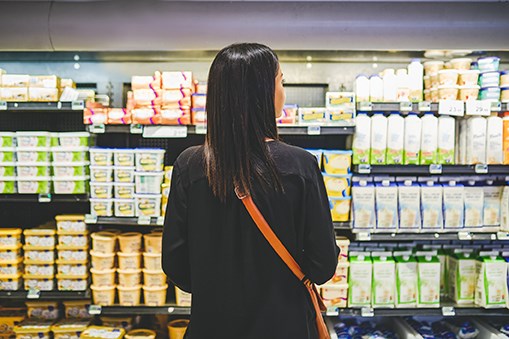This might indicate we are paying attention to our food but alas, I emphatically tell you, as a collective, we’re not.
If we understood the true cost of factory dairy farming, we would be appalled, and the shock might jolt us into climate justice action — hopefully.
Our food systems are complicated, but most of us have no idea how butter arrives wrapped in foil placed in rows behind the grocery store fridge’s glass doors.
The truth is, industrial animal farms are often “hellscapes.” Some workers actively abuse and commit violence against vulnerable animals.
Have a look through Sentient Media, a non-profit journalism organization exposing how we use animals in our daily lives.
There are activist organizations like The Humane League, PETA, and Mercy for Animals, revealing the truth of our relationship with animals and begging us to see that truth. Government, Alberta first then Ontario, have created laws known as the Ag Gag, that make it illegal for activists to witness animal abuse. A person can be fined for reporting poor living conditions, including mistreatment or abuse of animals on farms, slaughterhouses, dairy farms, or any other facility holding animals.
Animals, like the cubes of butter, live every moment of their lives confined in rows, wrapped within metal bars and cement, and hidden in enormous windowless buildings.
If there was glass surrounding an industrial animal dairy farm, like the glass where our butter sits, we wouldn’t reach for dairy butter again.
The dairy industry has acknowledged to CBC, “palm products, including those derived from palm oil, are sometimes added to dairy cows rations in limited amounts.”
On our planet, everything is connected: palm oil production destroys forests, killing precious life-giving ecosystems and animals.
Indigenous people are inextricably linked to the land but their rights to access forests, food, livelihood, and culture are denied and detrimentally affected.
In fact, they are often violently removed and “pushed off the land, where they have lived for generations so that governments can give the land to palm oil companies," according to www.treehugger.com.
Palm oil production is responsible “for driving tropical deforestation, particularly in Malaysia and Indonesia, which produce 85% of the world’s palm oil supply. This rapid expansion has destroyed habitats for the Sumatran rhino, orangutans, and pygmy elephants.
Fires set to clear jungle growth and carbon-rich peat soils pollute the air, and sometimes smolder for years, impossible to put out," says www.treehugger.com.
So, the next time you fancy a think on how butter has changed, I encourage you to connect those thoughts to the sentient beings, cows in this case, that suffered horrors to provide it, the catastrophic life-killing deforestation of our planet contributing to the climate crisis and the capitalistic colonial violence Indigenous people are suffering as they are displaced from their lands for either palm oil production or feed for cattle.
Last but not least, we need to know who these companies are because they are making billions while causing destruction and suffering, and we butter buyers are participating in their profits.
So as we reach for our butter and the door to the dairy case closes, so continues violence and displacement of Indigenous people, industrial animal farm industry abuse and the production of palm oil, and deforestation contributing to the climate crisis. We need to change our relationship with animals, with our food, with each other, and fast.
Taking farming out of the iron capitalistic grip of the multi-billion-dollar industry and the political power supporting them and into the hands of small family-owned biodiverse farms: human rights-based, animal rights-based, sustainable, restorative, small, local, fair and ethical farming rooted in climate justice.
Kim Benson
Squamish



